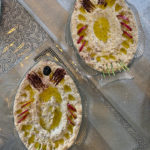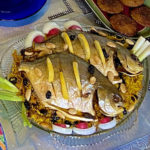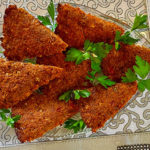Taghreed Mahmood:
Sharing the joys of Iraqi food with Project Feast and beyond
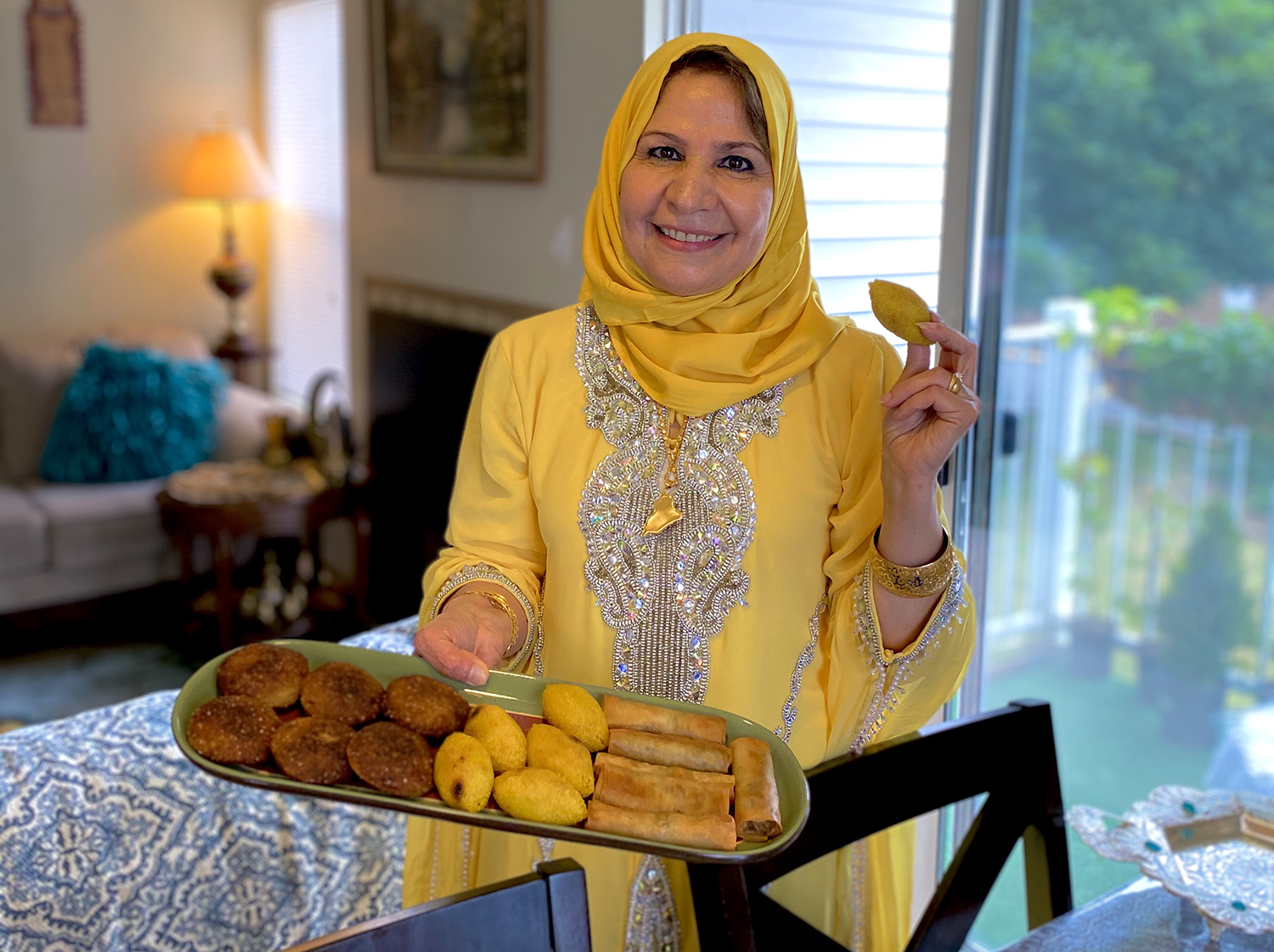
“Sharing food means love.”
Taghreed was a Project Feast student – and then a cook-instructor in the catering program – starting in 2013
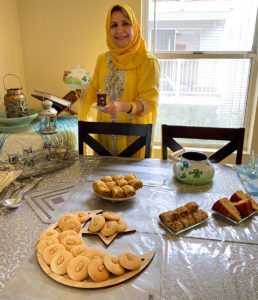
Taghreed Mahmood says it’s important for food to look as beautiful as it tastes: “I focus on presentation. It’s my signature.”
Taghreed Mahmood brings dish after dish to the elegant luncheon table, each seeming more beautiful than the last. Her tabbouleh is topped with a tomato cut like a rose. Her baba ghanoush is a canvas for dots of olive oil and scattered tomatoes, olives and parsley – like a painting of a garden scene. One platter offers savory treats in red and gold: Lahem ajeen (round flatbread topped with ground beef, chopped onions, red pepper and tomato paste with spices), börek (phyllo dough filled with ground beef and spices), and three types of kubbah (rice, bulgur and potato). Another bowl overflows with glistening Iraqi-style dolmas (eggplant, onions and tomatoes stuffed with rice, ground beef and spices). At the end of the table, dessert plates beckon with baklava, badem (almond cookies) and orange tea cake.
Taghreed ladles lentil soup with dried mint into azure bowls, spritzes a bit of lemon on top – and laughs quietly when asked if she has made a feast typical of an Iraqi holiday. “In Iraq, we serve many dishes. Even if we have only one or two people, we have to serve food for 25 or 30,” she says, sitting down to join her guest in her Redmond home. “It’s a sign of pleasure.”
Taghreed grew up in Baghdad as the youngest – and only girl – in a villa with five brothers. She was an 18-year-old newlywed in her husband’s family’s home when her mother-in-law taught her to cook. “She was teaching me to cook everything and we were enjoying and singing,” Taghreed says. “I was so young! I loved her food and I loved to learn.”
AS TAGHREED’S PASSION FOR FOOD GREW, one of her greatest joys was sharing the table. “We used to share food with our neighbors, Christians, when they had holidays,” she says. “We shared food to say ‘Happy Thanksgiving! Happy Christmas!’ And they also came over with food to say ‘Happy Ramadan! And ‘Happy Eid!’ So nice.”
In Baghdad, Taghreed had a successful career as an accountant and traveled regularly throughout Europe for summer vacations. Her family grew to include two sons and a daughter.
But the U.S. occupation of Iraq in 2003 changed everything, and in 2005 the family left in search of a peaceful life. They spent time over the next several years moving to Syria, Egypt, Jordan and Turkey. In 2011, Taghreed’s family decided to seek immigration support from the United Nations High Commissioner for Refugees. “This kind of decision is not easy to take,” Taghreed says. “I had a wonderful life in Iraq. Because of the war, I lost my job. I was forced to leave my country.”
Taghreed carried her love of cooking with her on the long journey that eventually brought her to Seattle in 2013.
SOON AFTER SHE ARRIVED in the Pacific Northwest, Taghreed learned of Project Feast, which was then in its first year. Project Feast helped her obtain her Washington state food-handler’s permit and she began working with the nonprofit’s catering team. Soon she was teaching and sharing her abundance of knowledge and enthusiasm for Iraqi cuisine. She taught her first Iraqi cooking class that fall for Project Feast – and the Al Jazeera television network invited her to demonstrate her recipes for a cooking show.
Taghreed’s youngest son finished high school in Seattle and earned his undergraduate degree from the University of Washington. He is now in Paris studying for his master’s degree. Her older son and his family live in Libya; her daughter and her family are in Turkey. “I have only three kids and we are separated,” she says. “We are a global family.”
Taghreed saw her daughter on a trip in 2019, but was not able to see her older son because travel to and from Libya was not safe for either of them. The separation from her children weighs on her, and Taghreed hopes American lawmakers will take up the cause of Iraqi asylum cases that are on hold. “My kids, they’re my whole life,” she says. “I feel like I’m a mom with an empty lap and so much love in my heart, and pain.”
Taghreed has been working since 2014 for Dynotag, a Bellevue company that makes medical ID “smart tags” – and her production responsibilities have taken on new importance this year during the coronavirus pandemic. But Taghreed still finds great comfort in sharing her love for the food of home. When she’s asked to make an Iraqi dish, she’ll often choose to make layered rice dishes like biryani or mutabbaq. “I focus on presentation. It’s my signature,” she says. “I do layers of yellow, red and white. Like a painting.”
“I believe food brings people together. Sharing food means love because food is love.”
– Interview and writing by Denise Clifton, Tandemvines Media
Baba Ghanoush
45 minutesIngredients
- 2 large eggplants, Italian or globe
- 4 cloves of garlic
- 1/2 cup tahini
- 1/2 cup plain yogurt
- Fresh lemon juice and salt as needed
- 2 tbsp olive oil
- Black olives, parsley and tomato for garnish
Instructions
- 1. Bake the eggplants in 350-degree oven for 30 minutes. When cool enough to handle, remove the skin.
- 2. Place the peeled eggplants along with the garlic, tahini, yogurt and lemon juice in a food processor and pulse to mix them until combined. Add olive oil and salt as needed.
- 3. Spoon onto serving platter, garnish with sliced olives, tomato and parsley.
- Serves 5 to 6
Lentil Soup
30 minutesIngredients
- 2 cups red or yellow lentils
- One big onion
- 4 tbsp vegetable oil
- Turmeric, black pepper, cumin and salt to taste
- 1/2 cup vermicelli broken noodles
- Water as needed
- 2 large lemons, cut into wedges
- Dry mint for garnish
Instructions
- 1. Wash the lentils, then boil in water on until cooked.
- 2. Pulse lentils in a food processor until creamy and soft.
- 3. Add some water to desired thickness and bring to a boil on stovetop.
- 4. Add noodles, turmeric, black pepper, cumin and salt.
- 5. Saute the minced onion until golden, then add to the lentils.
- 6. Serve in a nice bowl with lemon wedges and garnish with dry mint.
- Serves 5 to 6.
Mutabbaq Samak Zubaidi (Silver Pomfret Fish Rice)
Ingredients
- 2 cups basmati rice washed and soaked in cold water for 30 minutes.
- 1 lb onion
- 1 cup almonds
- 1 cup raisins
- 2 to 3 tbsp noomi basra ground dried limes
- Green onion red radish, and basil for garnish
- 1 cup vermicelli broken noodles
- 1/2 cup vegetable oil
- 1 tsp saffron or turmeric for the rice
- 3 whole Zubaidi fish silver pomfret fish
- 1 to 2 freshly squeezed lemons
- 1 tbsp curry
- 1 tbsp turmeric
- Salt to taste
Instructions
Prepare the fish:
- 1. Clean the fish and lay out on a sheet pan.
- 2. Combine the lemon juice, curry, turmeric, and salt. Spoon over the fish and marinate for half an hour.
- 3. Bake the fish in a 350-degree oven for 25 to 30 minutes
Prepare the rice:
- 1. Boil the almonds until done, remove the skin and roast in a skillet until golden brown. (Alternatively, you can use pre-roasted almonds)
- 2. Wash the raisins and fry
- 3. Thinly slice the onion and fry until golden.
- 4. In a large bowl, combine the fried onions, almonds, raisins and noomi. Set aside.
- 5. In a large pot add 2 tbsp vegetable oil, fry the broken noodles until brown. Add soaked rice, saffron and turmeric. Mix well. Add 3 cups of water and bring to a boil. Reduce heat and simmer until rice is fully cooked. Add the onion mixture, combine well.
- 6. Spoon the rice onto a serving platter. Top with the baked fish and garnish with basil, radish, green onions, if desired.
- Serves 5 to 6.
- Taghreed takes special care in preparing this traditional fish dish and uses lemon colonia and incense in the kitchen to counter the smell of cooking fish.“We always serve fish with yellow rice because fish comes with lots of bones some of them are tiny like thorns. So yellow rice will make it easier to see the bones rather than white rice," she says. "To eat delicious fish, I should make it right. I believe something to do with the taste, but a lot of it is in the heart.”
Aurug Moselleyh
40 minutesIngredients
- 1 cup bulgur #2
- 2 cups jereesh
- 2 lb fatty ground beef (20%)
- 1 lb onion
- 1 lb tomato
- 2 green bell peppers
- 1 to 2 cups tomato paste
- 1 tbsp cumin, cloves and black pepper
- salt to taste
Instructions
- 1. In a large bowl, wash the bulgur and jereesh
- 2. Mince all vegetables
- 3. Add to the bowl with ground beef, tomato paste, spices and salt. Knead until tender and soft.
- 4. In a tray brushed with vegetable oil, lay the bulgur dough in medium thickness
- 5. Bake for 15 minutes at 350 degrees
- 6. Wait until cool, use nice serving plate and enjoy!
- Serves 6 to 8.
Badem (Almond Cookies)
40 minutesIngredients
- 2 cups almond flour
- 1/2 cup dry coconut
- 3/4 cup powdered sugar
- 2 egg whites
- 1 tsp vanilla
- 1/2 tsp salt
- 1 cup raw almonds
- 1 tbsp oil for the tray
Instructions
- 1. Mix all dry ingredients
- 2. Add the eggs whites, vanilla and salt.
- 3. Mix all together until tender.
- 4. Cover with plastic wrap and chill in the refrigerator for 15 minutes.
- 5. Roast the raw almonds for garnish.
- 6. Brush cooking tray with oil.
- 7. Roll the batter into balls about 1 tbsp each, garnish each piece with a roasted almond.
- 8. Bake for 15 minutes at 350 degrees or lower, depending on the oven. Cookies should be a light golden brown.
- 9. When done, let cool to room temperature then serve in a nice serving tray and enjoy.
- Serves 5 to 6

